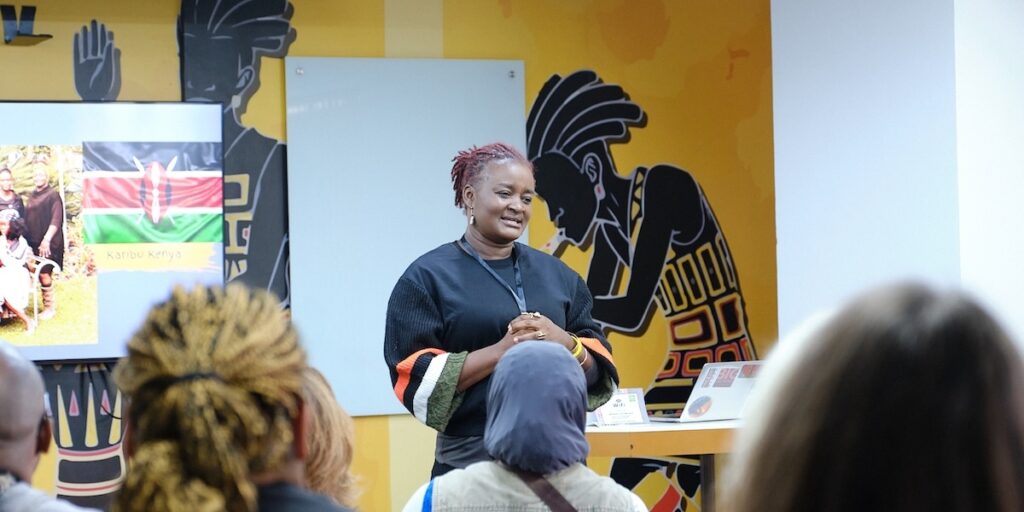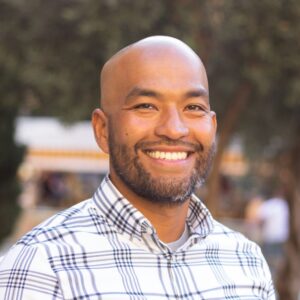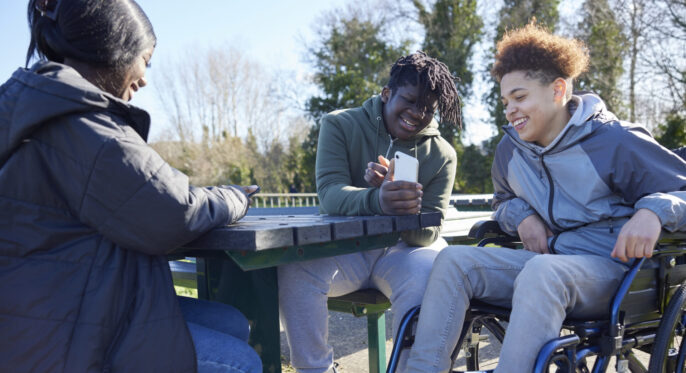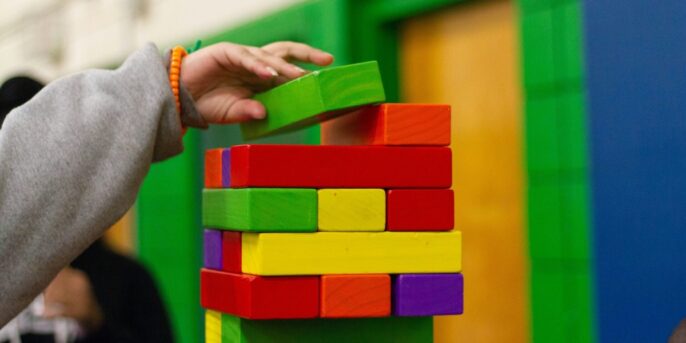It was early Monday morning, and despite the jetlag that still weighed on us, we were so excited for the day. We gathered for breakfast and talked about finally visiting Kenya Big Picture Learning, a B-Unbound out-of-school site that offers leadership and relational learning opportunities for youth people who have completed high school. The aim is to shift beliefs, attitudes, and values so that these young people see the potential in themselves and their communities. The most significant parts of the program are the intensive classroom-based summits, hands-on passion projects, and professional internships, all laying the foundation for youth to take charge by developing community service projects. I boarded the bus along with 35 other educators for one of Big Picture Learner’s Guided Experiences. We all chatted excitedly as the radio played softly in the background. But as we approached Kibera, the largest slum in Kenya, the bus fell silent. We could feel the weight of what we were seeing—the visible signs of poverty, lack of basic infrastructure, and crowded living conditions. It was a reality we couldn’t ignore or look away from.
Yet, as we pulled up to the school, something unexpected happened. The doors swung open and we were welcomed by laughter, music, and joy. Students smiling from ear to ear rushed to greet us and pulled us to dance, and at that moment, the darkness we had just experienced on the bus ride seemed to disappear. It was replaced by a warmth and light that radiated from the community. It was the beginning of a journey that would show us the true meaning of Kenyan resilience and strength.
At the heart of this strength is Carol Owala, Co-founder and leader of Kenya Big Picture Learning. Raised in Kibera, Carol intimately understands the challenges facing her community. But instead of being defined by those challenges, she chose to be a leader in the solution. Kuna Nuru Leadership Academy, a program she co-founded, is more than just a program—it’s part of a learner-centered ecosystem that nurtures not only academic skills but also leadership, creativity, and real-world engagement. Learners immerse themselves in hands-on experiences, working closely with local mentors, businesses, and organizations. Internships allow these learners to explore careers, develop skills, and tackle some of the most pressing issues in their communities. Carol’s vision goes beyond the traditional classroom. She believes that learning should be relevant, connected to the world, and centered on the student’s unique strengths and passions. Through this, she is empowering and equipping young people with courage, skills, and agency to bring real change to their community.
To truly understand the significance of her work is to understand the challenges facing Kibera’s youth. Families struggle to afford basic needs for food, shelter, and health concerns. In turn, education is not the top priority and some children leave school to help their family. For youth who do make it to school, they lack the basic necessities for learning and often enter overcrowded classes where 50 or more students in classrooms are common. Teacher shortages are real and training is inadequate. Learners enter make-shift classrooms that lack proper sanitation, electricity, or running water. And they enter a rote learning environment that does not accommodate their learning needs. Most alarming is the lack of educational parity between genders as female youth face challenges in early marriage, teenage pregnancy, and household responsibilities. Although the government recognizes the dire situation and is making progress in addressing these issues, progress is slow and Kibera’s youth and families are not left with many options. In the middle of this perfect storm, Carol and her team offer something life-changing.
Carol Owala’s work challenges the single narrative that surrounds places like Kibera. Yes, there is poverty. Yes, there are real struggles. But there is also brilliance, creativity, and a fierce determination to rise above those challenges. Carol is not just transforming education, but transforming lives.
Sonn sam
Throughout the week, we visited students who were living proof of Carol’s vision. Habiba Osman, an 18-year-old, is one such student. After graduating from Kuna Nuru Leadership Academy, she began an internship with the Sunflower Trust, an organization focused on literacy and leadership development. In her role, Habiba encountered the issue of illiteracy in her community and immediately took action. She researched and presented strategies to reduce illiteracy, showing that she was not just learning—she was leading. We also met Ronny Rodgers, who has a deeply personal connection to his work. His parents’ health struggles inspired him to intern at Riruta Health Centre, where he saw firsthand the devastating effects of hypertension on the elderly in his community. Ronny didn’t just observe—he acted. He began educating both young and old on managing and preventing hypertension, showing how one person can make a lasting difference. And then there was Tracy Chilaka, a 21-year-old who combined her passion for fashion with social advocacy. During her internship at Cheka Mamas, Tracy launched a project focused on period poverty, an issue she had experienced firsthand. She worked to raise awareness and is now developing reusable sanitary pads to help young girls in her community stay in school. This real-world learning design not only empowered young people through exploring their interests/passions, connecting them with local experts who shared those interests/passions but also engaging them in real work that has an impact.
Nevertheless, Carol didn’t stop there. The mamas of the community thanked her for what she was doing for their children, but they had another challenge. They shared they wanted better for their families and wanted to develop their skills to earn more income. She obliged and started tinkering with ideas. This led to the creation of Cheka Mamas (“cheka” in Swahili means “to laugh”), a program that teaches mothers in the community the art of fashion design and entrepreneurship. So far, three mamas have created businesses of their own and Cheka Mamas has expanded into a full-fledged co-op training program servicing more and more mothers. By giving these mamas a trade, Cheka Mamas is helping lift families out of poverty and impacting generations to come.
I have known Carol for a few years now. We met during our Big Picture Learning Big Bang conference where Carol brings hundreds of pounds of goods made by Cheka Mamas to fundraise for them and her schools. After every interaction, I leave saying, “Dang, this woman is incredible.” Fast forward five years and I am in her community witnessing the breadth of her work and impact in real time. There are no words that can accurately capture her impact but I will try. Carol Owala’s work challenges the single narrative that surrounds places like Kibera. Yes, there is poverty. Yes, there are real struggles. But there is also brilliance, creativity, and a fierce determination to rise above those challenges. Carol is not just transforming education, but transforming lives.
My time in Kibera taught me that education is the most powerful tool for change. It is not just about learning different subjects, it’s about empowering young people to see their own potential. And while Kibera faces undeniable challenges, they are also places where hope, resilience, and opportunity live. Carol, her students, and the community have shown us that when we invest in the potential of every learner, regardless of where they come from, we unlock a future filled with possibility. This is not just their story—it is a universal one. We owe it to students everywhere to reimagine education in ways that honor their strengths and dreams. What I saw in Kibera is proof that this approach works, and it is a story of hope that deserves to be told far and wide. This journey has left me with one certainty: Every learner deserves to be seen, heard, and given the opportunity to shine. In communities like Kibera, that brilliance is already lighting a new way forward.




